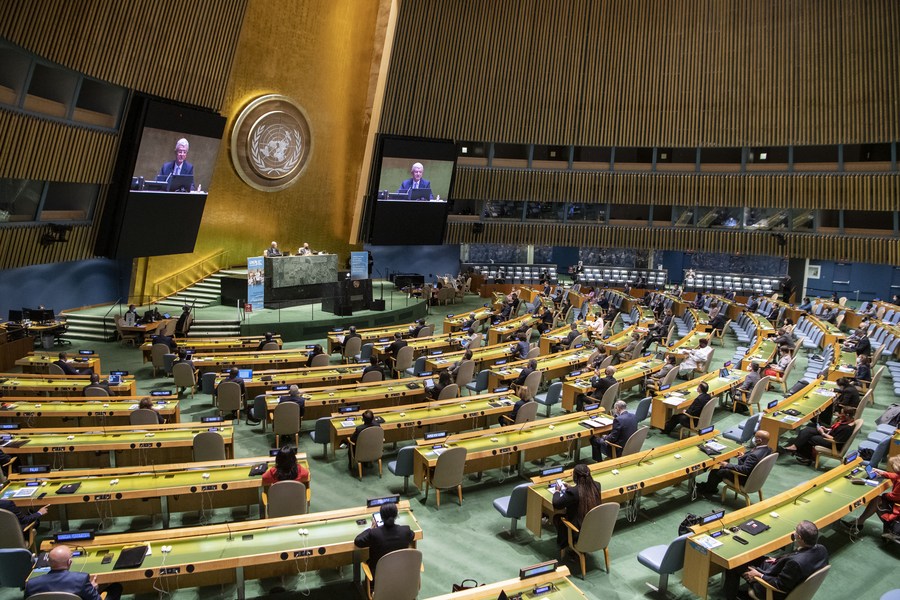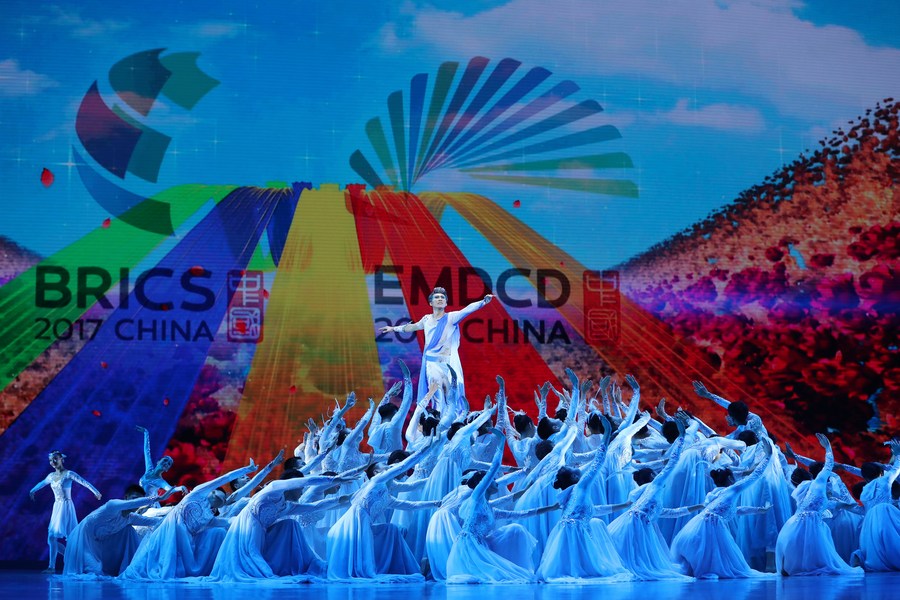
Volkan Bozkir, president of the 75th session of the United Nations General Assembly (UNGA), addresses a high-level meeting to commemorate the 75th anniversary of the UN at the UN headquarters in New York, Sept. 21, 2020. (Eskinder Debebe/UN Photo/Handout via Xinhua)
After all, the danger of a single or a few powers hijacking multilateralism for self-interests is as much destructive as, if not more than, the blunt practice of unilateralism.
by Xinhua writer Shi Xiaomeng
BEIJING, Jan. 25 (Xinhua) -- Four years ago, when world leaders and business titans gathered for the World Economic Forum (WEF) in the Swiss ski resort of Davos, the world was facing a consequential choice between sticking to the path of multilateralism and giving way to unilateralism championed by Washington's "America First" doctrine.
Four years later, the international community, profoundly challenged by a seething pandemic, an agonizing economic recession, as well as a fleet of other daunting global problems, is facing a new critical test of resisting all forms of pseudo multilateralism and upholding the genuine one.

Photo taken on Jan. 16, 2017 shows the logo of the World Economic Forum (WEF) in Davos, Switzerland. (Xinhua/Xu Jinquan)
While the globalist feast of the WEF in 2017 gave an unequivocal support for multilateralism, this year's forum, a virtual event that opens on Monday, provides a timely venue for the global community to gather greater global consensus to make the right decision once again.
Modern multilateralism can date back to the age when the Peace of Westphalia was negotiated and settled. It was born to lessen the leverage of the powerful over the weak and to reduce conflicts. In the following centuries, multilateralism has experienced constant evolution to meet the needs of different times.

Performers dance during an evening gala for the 2017 BRICS Summit and the Dialogue of Emerging Market and Developing Countries in Xiamen, southeast China's Fujian Province, Sept. 4, 2017. (Xinhua/Pang Xinglei)
For instance, the United Nations was founded as one of the pillars of the post-war world order to underpin global peace in the wake of the Second World War. The BRICS bloc that groups Brazil, Russia, India, China and South Africa, was formed when a sustainable global economic growth needs stronger and more coordinated input from the world's major emerging economies.
However, a genuine form of multilateralism demands far more than a number of countries bundling together for a self-serving purpose. History does not lack painful lessons of some major powers abusing multilateralism as a tool for hegemonic ambitions. The Iraq War in 2003 was such a classic example.

Photo taken on Sept. 14, 2020 shows the outside view of the United Nations headquarters in New York, the United States. (Xinhua/Wang Ying)
At this utterly challenging crux in human history, it is imperative for the global community to debunk and deny all kinds of manipulations of multilateralism and to stick to the right path.
To begin with, closed-group politics usually takes the camouflage of multilateralism. By gathering together, some wealthy world powers have formed exclusive clubs, seeking to dictate the world's agenda on key global questions so as to put their interests ahead of common interests of the wider world.
A second pattern of phony multilateralism is found in a handful of countries' attempt to monopolize the rights to stipulate rules for the world, and impose their will on the entire international community.

Photo taken on Sept. 14, 2020 shows the United Nations (UN) flag flying outside the UN headquarters in New York, the United States. (Xinhua/Wang Ying)
The age when the globe could be dominated by one or several major powers has long gone and will never return. For a fairer world order, global affairs should be managed collectively and the world's rules need to be written jointly by all countries, big or small, wealthy or poor.
Also, the dangerous move of ideologizing multilateralism to forge value-based alliances targeting specific countries should be alerted to. Those divisive actions will only crumble trust among nations and fortify ideological entrenchment that will lead to greater confrontation.
For centuries, from ending two world wars to terminating the 2008 global financial crisis, multilateralism, even in its nascent stage, has proved to be an effective way to supplant a lack of global governance in an anarchic state of the world, safeguard world peace and promote global prosperity.
The world today is undergoing changes unseen in a century, and the human race needs more than ever multilateralism to vanquish the deadly pathogen, slow down the rising of sea levels, boost collective security and bolster common development. None of those tasks can be achieved single-handedly.

Photo taken in New York on Sept. 24, 2020 shows UN Secretary-General Antonio Guterres speaking via video at a summit-level Security Council debate on "global governance after COVID-19". (Xinhua/Wang Ying)
Of course, no one should expect the multilateral mechanisms required in today's world will stay exactly the same as the ones when the United Nations was founded. However, such purposes and principles as stated in the UN Charter and other fundamental norms governing international relations, including mutual respect for sovereignty and equality of all countries, should be carried forward.
Washington's reckless pursuit of unilateralism over the past four years has shown that multilateralism, despite being the wave of the human future, is not something that the world community can take for granted.
The new U.S. administration has extended a welcoming gesture by agreeing to return to the Paris climate accord and the World Health Organization. Nevertheless, for genuine multilateralism to succeed in the future, the world community should always stay vigilant against all fake types.
After all, the danger of a single or a few powers hijacking multilateralism for self-interests is as much destructive as, if not more than, the blunt practice of unilateralism. ■




